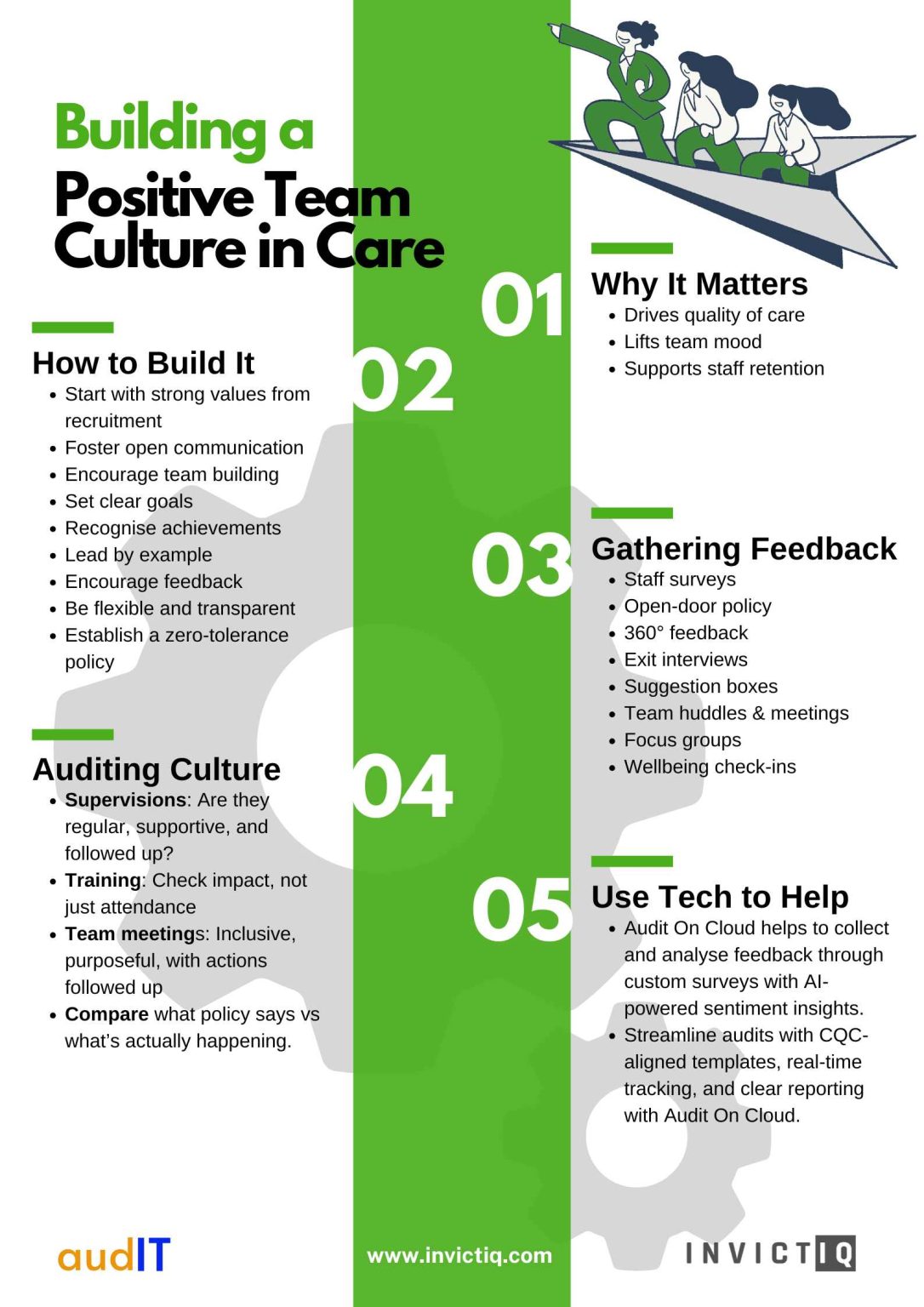I often reflect back on my journey in my current company, and previous ones around the changes that I have made and/or influenced, and one repeated them is around the culture within the service, especially relating to team culture as I find this helps drives the care being delivered, the mood within the service and supports the retention within the team.
Under the CQC’s Single Assessment Framework, within the “Well-Led” domain, it talks about leadership fostering a positive, inclusive culture of continuous learning and improvement and I thought I would utilise this blog to explore this further (along with another great infographic to utilise)
Why Team Culture Matters
As mentioned above, team culture can help drive the care being delivered, the mood within the service and supports the retention within the team and it cannot be a nice to have, but an essential part of the business. There are many resources available online to support a strong team culture, but studies have shown that staff who feel more connected to their work boosts engagement, increases communicate and ensures effective collaboration. Whilst the online resources are useful, I would recommend that you speak to your team to seek their feedback on what is working well and what could be improved or changed.
How to Build a Positive Team Culture
There are many resources available for further reading on how to build a positive team culture, but some of the key things are:
- Ensure you have strong values within your organisation, that all staff buy into from the start of their journey with the company (recruitment adverts, interviews etc)
- Foster open communication
- Encourage team building
- Set clear goals
- Recognise and celebrate achievements
- Lead by example
- Encourage feedback
- Ensure diversity, equity and inclusion initiative are embedded
- Establish a zero-tolerance policy
- Be flexible
- Be transparent
Utilising Feedback
We know the importance of feedback in social care, and we know that it makes up a large % of CQC inspections, in both homecare and care homes. The most important thing for me with feedback, is that we utilise this and improve our services. I would strong urge you to look into feedback loops as this will help you understand how best to implement feedback and communication to your teams. Some easy ways to gather feedback that you could implement are:
- Regular staff surveys (anonymous and structured)
- Open-door policies where staff can drop in and share their ideas, concerns and thoughts.
- 360-degree feedback for leadership
- Exit interviews to identify patterns
- Suggestion boxes
- Team huddles, team meetings, relative meetings and meetings with those you support
- Focus groups
- Wellbeing check-ins
Platforms like Audit on Cloud by InvictIQ enables quick collection of stakeholder feedback via targeted customisable surveys. AI analyses sentiment, highlighting areas of concern so providers can prioritise actions with clarity and speed.
The Importance of Auditing
I have spoken many times about the importance of auditing, and implementing one to review culture is just as important as one around medication, record keeping etc. Some of the auditing I would start with would be:
- Supervisions help build trust and ensures your team feel supported, valued and heard. Your audit should be checking that these are happening regularly (and in line with your supervision policy), they are supportive, focused on development and performance, actions are actioned.
- Training audits should be checking more than attendance levels (this is important from a cost perspective for the organisation) and the audit should be looking at staff feedback on what they learnt, if it has increased confidence, compliance per course and competencies to ensure learning is being embedded.
- Team meetings are something held in all services, but often not always audited. You should be checking that they are inclusive and allow all voices to be heard (not just the louder ones in the team), that they are purposeful and focus on performance but also praise. You also want to check how minutes are behind cascaded to those who could not attend and that any actions noted are being actioned and closed.
All audits should be compared to what policy and protocols state compared to what is actually happening, to allow you to make adjustments and align them both. Audit on Cloud by InvictIQ makes it easier by streamlining internal audits with smart templates aligned to CQC standards. It also tracks compliance in real time, flags risks early, and simplifies reporting for confident, inspection-ready oversight.
Culture and CQC Expectations
Under the CQC’s Single Assessment Framework, the “Well-led” key question evaluates whether leadership fosters a positive, inclusive culture of continuous learning and improvement.
Inspectors will be looking for:
- Shared vision and values across the organisation
- Staff feeling respected, supported and valued
- Leaders who model openness, honesty and integrity
- Use of data and feedback to drive improvement
CQC will review your policies, procedures, documentation (including audits) and will triangulate this with interviewing and speaking to your teams and they do this to ensure what your staff say, what your audits show, and what your outcomes reflect must all tell the same story.
You can read more about the CQC Well-Led domain here www.cqc.org.uk/guidance-regulation/providers/assessment/single-assessment-framework/well-led but I would use this and the whole CQC framework as a self-assessment tool – again you could turn this into an audit of its own.
It is important to remember culture isn’t built in a day, and this is something you will need to work at each day, over a period of time. The important part is listening to your team, ensuring you audit most parts of your business to ensure practice matches policy and that you are creating a place where people want to work and deliver great care.



